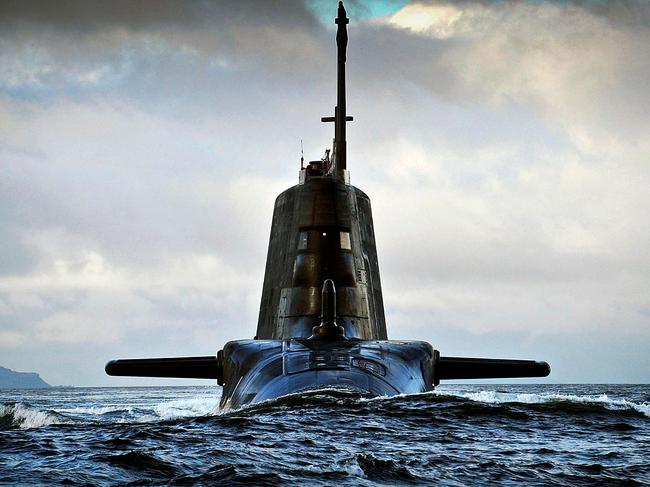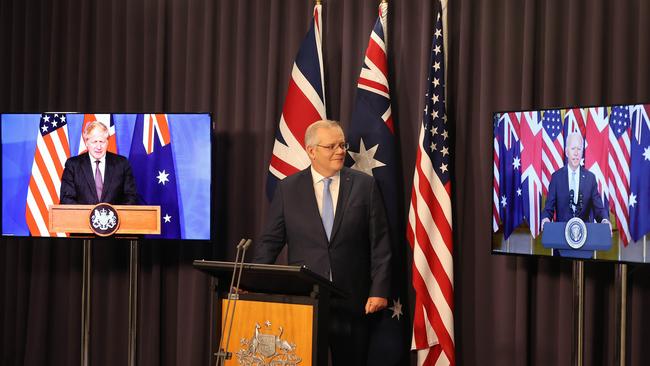Nuclear-powered submarines to be built in Adelaide in new UK, US security deal
Adelaide shipworkers will build a new fleet of nuclear-powered submarines under an Australian, US and UK defence and security alliance – as France says it’s been “stabbed in the back”.
SA News
Don't miss out on the headlines from SA News. Followed categories will be added to My News.
Adelaide will build a new fleet of nuclear-powered submarines in a historic partnership forged between Australia, Britain and the US.
In the biggest escalation of Australia’s defence capabilities in decades, aimed at countering a belligerent China, Prime Minister Scott Morrison announced on Thursday morning at least eight submarines would be built at the Osborne shipyards, creating local jobs for generations.
It is the first major initiative of a new “forever partnership” between the three allies – dubbed AUKUS – that has also led to Adelaide securing a suite of other defence contracts worth $11.5bn, including the highly sought-after Collins-class submarine full-cycle docking project.
Mr Morrison, in a special early-morning address with US President Joe Biden and British Prime Minister Boris Johnson, vowed the alliance would create a “safer and more secure region (for) all”.
The Prime Minister said the “relatively benign environment” Australia had enjoyed for many decades was over.
“Our world is becoming more complex, especially here in our region, the Indo-Pacific,” Mr Morrison said.
“To meet these challenges, to help deliver the security and stability our region needs, we must now take our partnership to a new level.”

Mr Morrison insisted France remained an “incredibly important ally”, while acknowledging the “very difficult and disappointing decision” for French President Emmanuel Macron.
French officials were outraged by the announcement.
“It is a decision contrary to the letter and the spirit of co-operation which prevailed between France and Australia,” French Foreign Affairs Minister Jean-Yves Le Drian said.
He told Franceinfo radio it was a “unilateral, brutal, unpredictable decision”.
“A knife in the back,” he said, adding that Australia rejected a deal that involved “a lot of technological transfers and a contract for a 50-year period.”
French diplomat Gerard Araud also lashed out at the arrangement.
Mr Araud, the former French ambassador to the US, said the deal had nothing to do with nuclear capabilities, but instead Australia trying to secure a “juicy contract”.
“France has just been reminded this bitter truth by the way the US and the UK have stabbed her in the back in Australia.
“(This) has nothing to do with capabilities … France was able to sell nuclear-powered submarines.”
Mr Biden called AUKUS a “historic step”, deepening co-operation between the three nations.
“This is about investing in our greatest source of strength, our alliances, and updating them to better meet the threats of today and tomorrow,” Mr Biden said.
The US will share with Australia highly sensitive nuclear submarine technology to be handled by workers in Adelaide. The last time the US granted access to such knowledge was to Britain in 1958.
The new fleet of nuclear-powered submarines, to be armed with conventional weapons, means the troubled $90bn Attack-class program, led by French company Naval Group, has been axed.
The future of about 350 South Australian Naval Group employees is now uncertain, and they will be told of transition arrangements on Friday morning.
Finance Minister Simon Birmingham and Premier Steven Marshall will hold a press conference at ASC – the government-owned builder of six Collins class submarines.
A senior industry source has told The Advertiser it is expected that all Naval Group employees will be transferred to ASC, which is based at Osborne Naval Shipyard.
In a statement on Thursday, the company said it was disappointed about the new alliance.
“For five years, Naval Group teams, both in France and in Australia, as well as our partners, have given their best and Naval Group has delivered on all its commitments.
“The analysis of the consequences of this sovereign Australian decision will be conducted with the Commonwealth of Australia in the coming days.”

Mr Morrison said the nuclear submarines would provide “game changing differences” over the conventional diesel-electric Attack-class, which was decided as the future submarine of choice five years ago.
“Nuclear submarines have … greater endurance, they are faster, they have greater power, greater stealth (and) more carrying capacity,” he said.
“Australia was not in a position at the time we took the decision back in 2016 to build and operate a nuclear-powered submarine.”
Labor leader Anthony Albanese supported the strengthened alliance but labelled the scrapping of the Attack-class the “single biggest admission of failure” over the program.
“Eight years into this program and after three separate deals, Mr Morrison is now starting from scratch,” Mr Albanese said in a joint statement with SA senator and Labor foreign affairs spokeswoman Penny Wong.
Australia has spent about $2.4bn to date on the now-defunct program and will need to pay unspecified compensation costs.
Mr Morrison promised skilled workers now without a job would be absorbed by the industry for future projects. “Your skills are in unprecedented demand,” he said.
“We will continue to enlist you in this great national effort to ensure the skills that have been developed are kept with this great national enterprise.”
In announcing the eight new future submarines would be built in Adelaide, Mr Morrison declared “the lift will only go up, it won’t come back down”.
“It is the single largest step we have been able to take to advance our defence capabilities in this country, not just at this point, but for the future,” he said.
The submarine project, alongside other major defence contracts secured in SA, is expected to support more than 5000 jobs by the end of the decade.
The exact timeline of the submarine construction and total cost remains vague, as the Defence Department embarks on an 18-month consultation period during which a special “task force” will work with Britain and the US on how to deliver the project.
Mr Morrison said construction would start on the submarines “within the decade” and the first vessels would hit the water “before the end of next decade”.
Maintaining the workhorse Collins-class submarine fleet, first commissioned in 1996, will become even more essential.
In an eagerly awaited announcement and after years of speculation, Mr Morrison revealed Adelaide had secured the Collins full-cycle docking work, keeping 900 jobs in SA.
The life-of-type extension of the submarines will also happen in Adelaide from 2026, creating a further 400 jobs. Up to $6.4bn will be poured into the two projects.
Starting in 2024, the highly sophisticated Aegis combat system in the Hobart-class air warfare destroyer fleet will undergo major upgrades at the Osborne shipyard as part of a contract worth $5.1bn and creating 300 jobs.
Adelaide naval workers will also equip the two SA-built ships with the highly precise, long range tomahawk cruise missiles.
“South Australia is the home to some of the most skilled shipbuilding workers in the world,” Mr Morrison said.
“They have the know-how, ingenuity, industrial knowledge and determination that is required to provide our Defence Force with the very best capability.”
Premier Steven Marshall lauded the suite of work a decades-long “jobs bonanza” for SA.
“This really cements South Australia as the maritime capital of the nation,” Mr Marshall said.
“We’re building the facilities and the capabilities that Australia needs now and into the future.”
Opposition leader Peter Malinauskas levelled criticism against the Liberals for creating “grave uncertainty” for “thousands of jobs and tens of billions of dollars of investment” associated with the scrapped Attack-class program.
“The future submarines project was a shining light on the hill for our state – now that has all been thrown into uncertainty,” Mr Malinauskas said.
SA senator Sarah Hanson-Young warned the nuclear submarine deal would put a “target” on SA’s back.
“Many Australians … are feeling scared and worried about what the consequences will be,” Senator Hanson-Young said. “This is a serious escalation in our military policy and spending.”
New Zealand Prime Minister Jacinda Ardern declared Australia’s nuclear submarine fleet would be banned from its waters.
The Kiwis have been nuclear-free since the 1980s and have no interest in relaxing the ban.
“New Zealand’s position in relation to the prohibition of nuclear-powered vessels in our waters remains unchanged,” Ms Ardern said.
Mr Morrison stressed the submarines would just be nuclear powered and not armed with nuclear weapons.
The Prime Minister will travel to Washington on Monday for the first in-person meeting of the Quad alliance, which includes Australia, the US, Japan and India, as well as his first one-on-one with Mr Biden.
UK Prime Minister Boris Johnson is also expected to travel to the US in coming days to meet with Mr Biden.
The Advertiser in April reported a substantial reduction in the number of submarines built at Osborne – 12 are planned to be constructed – was being speculated about in political and defence circles.
Mr Morrison in Adelaide in March announced the development of a $1bn weapons manufacturing centre would be accelerated to boost jobs and supply guided missiles to Australia’s defence forces.
An industry partner for the “Sovereign Guided Weapons Enterprise” was to be selected by the end of the year, along with a location.
Three major defence firms with significant operations in Adelaide were expected to be considered as potential partners – Raytheon, BAE Systems and Lockheed Martin.
The missiles and guided weapons would be used across the ADF and developed in consultation with the US, Mr Morrison said at the time.
In a visit to Raytheon Australia’s $50m Centre for Joint Integration, at Mawson Lakes, Mr Morrison also announced a $111m support contract for missile launchers, sensors and command and control shelters to be assembled and tested there.
“Creating our own sovereign capability on Australian soil is essential to keep Australians safe, while also providing thousands of local jobs in businesses right across the defence supply chain,” Mr Morrison said at the time.
– with additional reporting from David Aidone, Jade Gailberger and Charles Miranda.
More Coverage
Read related topics:Defence Industries




